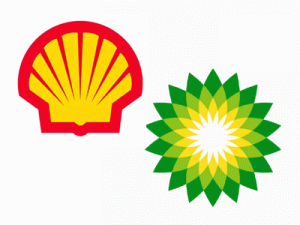BP Plc and Royal Dutch Shell Plc, Europe’s biggest oil companies, aim to resume exploration in Libya, whose new government seeks to stabilize relations with foreign companies following the ouster of Muammar Qaddafi.
BP Chief Executive Officer Robert Dudley and Shell CEO Peter Voser said yesterday in Doha, Qatar, they’re evaluating resumption of drilling at wells begun before hostilities broke out at the start of this year. Total SA CEO Christophe de Margerie said today the French company aims to develop new production in the country after it restores output at fields that it was forced to shut down because of the violence.
“There is a real interest that we can deploy technology and our people and raise production,” ConocoPhillips CEO James J. Mulva said in an interview, referring to the transitional government’s plan to bring oil companies back to Libya. “We can restore production and hopefully this gives us the opportunity to do even more.”
Production Recovery
International oil companies need access to new crude and natural gas deposits to meet global demand, which is expected to grow over the next two decades, according to Dudley, Voser and Exxon Mobil Corp. CEO Rex Tillerson. The three executives were in Doha this week for the World Petroleum Congress.
Total aims to be one of the companies that Libya chooses the help develop new production of oil and gas and to raise output beyond pre-revolution levels, de Margerie said.
“The priority is restarting production in a sustainable way,” he said. “Then there is room for additional developments and research for increasing recovery rates. There is room for new projects.”
The French company is in discussions with the new Libyan government to drill wells offshore there, said Stephane Michele, director of exploration and production for Qatar. Total had drilled two exploration wells before unrest started and aims to resume its offshore exploration program there, Michele said in an interview yesterday.
Other IOCs
Other international oil companies that were already producing in the North African state, such as ConocoPhillips, Repsol YPF SA and Eni SpA, are boosting output.
Repsol, Spain’s biggest oil company, is raising output and is now pumping 200,000 barrels a day in Libya, CEO Antonio Brufau Niubo told reporters yesterday. It has a production capacity of 340,000 barrels a day, he said.
Eni expects to raise Libyan output to pre-crisis levels of 280,000 barrels a day by June 2012 and is targeting production of 300,000 barrels a day in 2013, the Italian company’s Head of Exploration and Production Claudio Descalzi said last month.
Total reached 170,000 barrels a day of production at the Murzuk oil field and 40,000 barrels a day at the Al Jurf field in Libya, de Margerie said. The company hasn’t resumed production at the Mabruk crude field, he said.
Libya’s crude output had recovered to 840,000 barrels a day by the end of last month, the state-run National Oil Corp said Nov. 30. Production may increase to 1.3 million by June, former Oil Minister Ali Tarhouni said Nov. 25, less than a week after stepping down from the interim cabinet.
New Wells
OPEC Secretary General Abdalla el-Badri said Dec. 4 he expected Libya to be pumping about 950,000 barrels of oil a day by the end of this month, rising to 1.3 million barrels a day in the first quarter and to 1.5 million in the second quarter. Iran’s Oil Minister Rostam Qasemi said Dec. 5 it would take about a year for Libya to return to full production.
BP, which signed an exploration agreement with Libya in May 2007, stopped exploration in February when the revolt broke out. The company was “on the verge” of starting to drill two onshore and offshore wells in Libya, and has now been asked by the government to return to the country, Dudley said.
“We will make a decision when it’s the right time to ensure the safety of our employees,” he said.
Shell had been drilling two wells in Libya before the unrest and was considering a restart, according to Voser.
International Sanctions
ConocoPhillips and its partners had been producing about 350,000 barrels a day from Libya’s Waha field before violence against the Qaddafi regime broke out, CEO Mulva said. The company’s share of production was 50,000 barrels a day.
Libyan authorities have “indicated that they are going to honor the contracts” that oil companies had with the previous regime, Mulva said.
Libyan oil output, which rose as high as 3.4 million barrels a day in the early 1970s, stagnated in the 1980s and 1990s as international companies pulled out and the country was subjected to sanctions. Production remained at 1 million to 2 million barrels a day, according to BP Plc statistics compiled by Bloomberg.
A turnaround in its relations with the west came between 2002 and 2005 when Qaddafi abandoned a nuclear-arms development effort, pledged to destroy a chemical weapons stockpile and renounced terrorism. The move led to an easing of sanctions and improved ties with the U.S. and European nations.
Libya attracted investment from international oil companies including Eni, BP, ConocoPhillips, Total and Repsol as the country sought to raise production capacity to 3 million barrels a day. In 2009, Libya approved a 12.1 billion-dinar ($9.8 billion) plan to develop and upgrade 24 oil fields.
(Source: Bloomberg)





